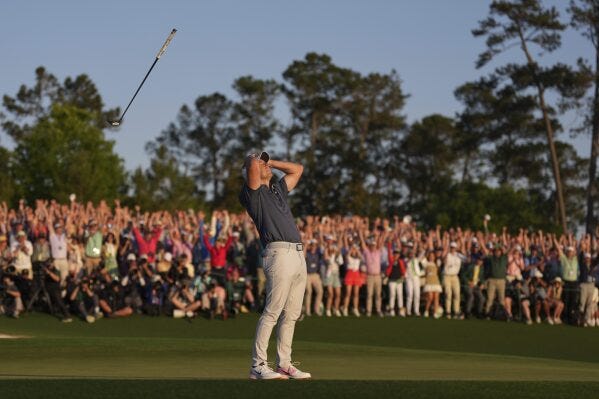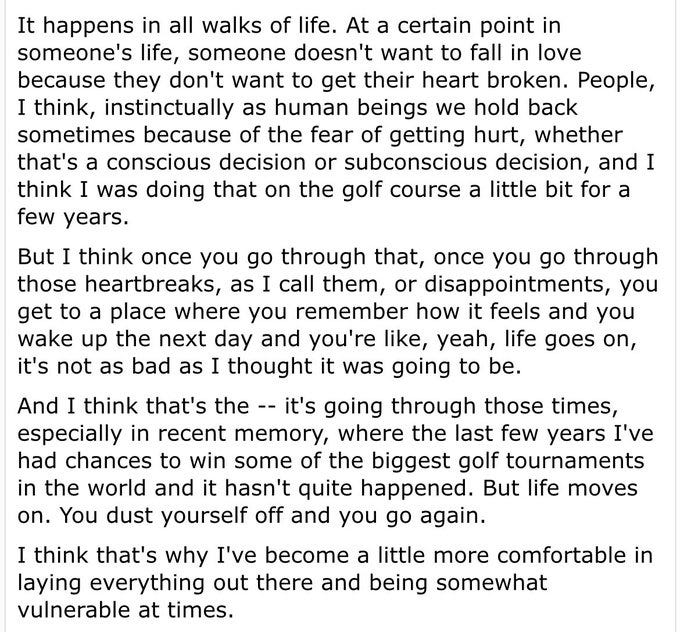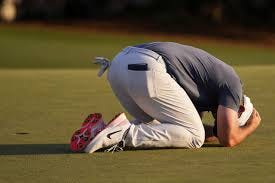"You dust yourself off and you go again" (1964)
Why Rory McIlroy's victory resonated beyond golf.
This is Throwbacks, a newsletter by me, Michael Weinreb, about sports, history, culture and politics, and everything in-between.
If you like what you read, please click the button below, join the mailing list for FREE and please share, on social media or through e-mail or however you feel comfortable sharing.
And if you’ve been reading for a while, please consider a paid subscription to unlock certain posts and help keep this thing going—you’ll also get full access to the historical archive of over 200 articles. (Click here and you’ll get 20 percent off either a monthly or annual subscription for the first year.
(If your subscription is up for renewal, just shoot me an email and I’ll figure out a way to get you that discount, as well. If you cannot afford a subscription and would like one, send me an email and I’ll comp you one, no questions asked.)
I.
Six decades ago, the writer Gay Talese published a profile of the boxer Floyd Patterson in Esquire magazine. Patterson was not an ordinary subject, just as Talese was not an ordinary writer. Patterson was sharp and introspective and eloquent; Talese was deliberate and thoughtful and at the dawn of a career as one of great narrative nonfiction writers of the 20th century. In those early years of Talese’s career, Patterson acted as his muse, a way for a young Talese to probe what it meant for a man to literally get knocked down and then get up again.
What was it like to accept defeat? Why did Patterson keep going? Was he even meant to be a boxer? Patterson had twice won the heavyweight title, and yet the headline of the article was “The Loser,” and it focused on the feelings Patterson experienced while being knocked down, time and time again, on the way to twice relinquishing that heavyweight title.
“But then,” Patterson told Talese, “this good feeling leaves you. You realize where you are, and what you're doing there, and what has just happened to you. And what follows is a hurt, a confused hurt—not a physical hurt—it's a hurt combined with anger; it's a what-will-people-think hurt; it's an ashamed-of-my-own-ability hurt. . . . And all you want then is a hatch door in the middle of the ring—a hatch door that will open and let you fall through and land in your dressing room instead of having to get out of the ring and face those people. The worst thing about losing is having to walk out of the ring and face those people. . . .”
II.
There was a moment on Sunday afternoon, on the 18th green at Augusta National Golf Club, when Rory McIlroy appeared to be spiraling once again into that wall of confused hurt. He blew a lead on the back nine and then missed a short putt that would have won him the Masters, and the tournament would go to a playoff hole now, and McIlroy’s history seemed to dictate that he would lose that hole and lose the tournament, and it was the kind of fascinating and horrifying juncture that transcended all the pretentiousness and classism of golf itself. In that moment, Rory McIlroy was not a 35-year-old multi-millionaire; he was just a dude nakedly confronting his own ignominy in front of millions.
Here is the thing about McIlroy: Like Floyd Patterson, he did not shy away from his anguish. He spoke honestly and openly about it for years, partly in the hope that public introspection would prove the path to self-actualization. Just last week, the day before this year’s Masters began, McIlroy spoke about his own failures to the media, and it felt like the kind of beautifully raw confession that Patterson might have uttered to Gay Talese all those years ago:
III.
I understand there are plenty of reasons not to watch golf, but there are few sports that so starkly lay bare the tremendous burden of what it means to be human. Rory McIlroy was alone out there, in the same way Floyd Patterson was alone in a boxing ring, and the fact that McIlroy was attempting to overcome his own failures for the past 11 years—the length of the gap between major championships for him, during which he grew from a post-adolescent into a full-on adult—only made this moment that much more compelling to watch.
It seemed clear that this moment wasn’t just about golf, either. As the sport has splintered over the past several years, and as many of McIlroy’s colleagues chose to chase the money on the LIV Tour with little or no regard for the consequences of throwing their support behind a repressive Saudi Arabian regime, McIlroy became the LIV Tour’s most outspoken nemesis, turning down hundreds of millions of dollars from them in order to stay with the PGA Tour. Pro golf is so often the epitome of a brazenly capitalistic pursuit, and McIlroy’s attempts to embrace traditionalism and hold the line—at least before the PGA Tour’s cowardly decision to merge with LIV—felt like the closest thing pro golf would ever get to a moral stand.
This led some of McIlroy’s enemies to label him as arrogant, including his Sunday playing partner, LIV Tour defector and ultra-buff bro Bryson DeChambeau, who claimed that McIlroy didn’t speak to him all afternoon on Sunday. Those who viewed McIlroy as self-righteous seemed to revel in his continued failure, and I have to imagine that all of this proved an additional emotional burden for McIlroy, and I have to imagine that this is also part of the reason why McIlroy put so much pressure on himself to succeed: Because even if he was not perfect, and even if he found himself embracing nihilism in the wake of the LIV-PGA merger, he was at least attempting to stand for something. And if he failed, so be it.
IV.
In the end, something wild happened. Rory McIlroy made a putt on the first playoff hole to defeat British golfer Justin Rose. He won the Masters, and he completed something only one other modern golfer, Tiger Woods, had accomplished: A career grand slam. And when it was over, the emotions were so overwhelming that he literally collapsed.
In that moment, a lot of people on social media who might not normally care about golf found themselves expressing feelings about golf. And I assume part of the reason this moment resonated beyond golf is because we have been surrounded for months now by so much rampant cruelty and nihilism, and we have been conditioned to presume that the worst is about to happen, and that human beings will always engage their basest instincts and chase money and personal gain and get rewarded for those choices. And it does not mean that much in the grand scheme of human events that Rory McIlroy, at least for a moment, appeared to break this cycle. But it was a brief reminder that, if we persist, if we embrace the heartbreak and the vulnerability, if we dust ourselves off and go again, we will eventually encounter a better version of ourselves.
This newsletter is very much a work in progress. Thoughts? Ideas for future editions? Contact me via twitter or at michaeliweinreb at gmail, or leave a comment below. If you enjoyed this newsletter, please subscribe and/or share it with others.





A few years ago, my wife and I toured Ireland. It happened to coincide with the Irish Open. I am not sure how much coverage it got in the US; probably not much. In any case, McIlroy won and donated all of his winnings to charity. I appreciated his support for the tournament and his philanthropy. This is an instance where the famous Leo Durocher quote was contradicted. A nice guy finished first at the Masters.